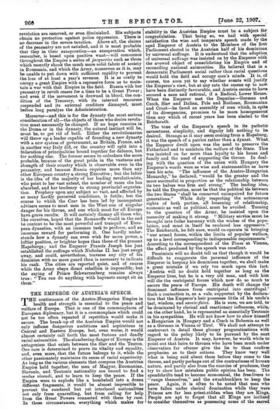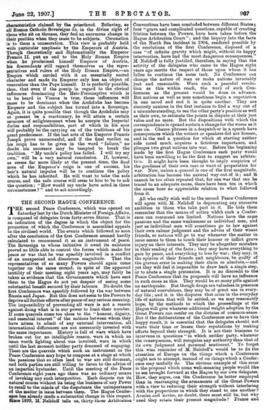THE EMPEROR OF AUSTRL&'S SPEECH.
"HE continuance of the Austro-Hungarian Empire in health and strength is essential to the peace and welfare of Europe. That is- one of the commonplaces of European diplomacy, but it is a commonplace which could not be too often repeated if repetition would make it secure. The break-up of the Austrian Empire would not only inflame dangerous ambitions and aspirations in Central and Eastern Europe, but, even worse, it would almost certainly call forth the most furious and deadly racial animosities. The slumbering danger of Europe is the antagonism that exists between the Slav and the Teuton. One race is determined to prove its vitality and equality, and, even more, that the future belongs to it, while the other passionately maintains its sense of racial superiority. As long as the various elements that compose the Austrian Empire hold together, the men of Magyar, Roumanian, Slavonic, and Teutonic nationality are bound to find a modes vivendi, and to learn to keep the peace. If the Empire were to explode like a bombshell into a dozen different fragments, it would be almost impossible to prevent the sundered but yet interlaced nationalities not only from quarrelling, but from calling for help from the Great Powers connected with them by race. In these circumstances, everything which makes for stability in the Austrian Empire mint be a subject for, congratulation. That being so, we bail with special satisfaction the wise and temperate speech made by the aged Emperor of Austria to the Members of the first Parliament elected in the Austrian half of his dominions by universal suffrage. It is understood that the adoption, of universal suffrage was insisted on by the Emperor with the avowed object of consolidating his' Empire and of reconciling national animosities. He believed that in a democratic Parliament social rather than racial questions would hold the field and occupy men's minds. It is, of course, too soon yet to say whether events will justify the Emperor's view, but at any rate the omens up to now. have been distinctly favourable, and Austria. seems to have secured a sane and rational, if a Radical, Lower House. When the Emperor met the Deputies—German and Czech, Slav and Italian, Pole and Ruthene, Roumanian and Croat—he faced an assembly of men which, in spite of its divergencies, promises to be more homogeneoui than any which of recent years has been elected to the Reichsrath.
The tone of the Emperor's speech in its pathetic earnestness, simplicity, and dignity left nothing to be desired. Strange as it may seem coming from a Hapsburg, it was the speech of a patriot rather than a dynast. What. the Emperor dwelt upon was the need to preserve the Fatherland and to maintain the welfare of the State. This was insisted on far more than loyalty to his house and family and the need of supporting the throne. In deal- ing with the question of the union with Hungary the Emperor's words were as wise and statesmanlike as have been his acts. "The influence of the Austro-Hungarian. Monarchy," he declared, "would be the greater and the more successful in proportion as the relationship between its two halves was firm and strong." The leading idea,- he told the Deputies, must be that the political tie between the two States " shall be conserved unimpaired for future generations." While duly respecting the autonomous rights of both parties, all loosening of relationship, economic as well as political, must be avoided.. Turning to the question of the Army, he insisted upon the necessity of making it strong. "Military service mint be brought into fuller harmony with the wishes of the popu- lation, and must in Itself be rendered less oppressive." The Reichsrath, he felt sure, would co-operate in bringing "our armed forces, within the limits of popular welfare, up to a level corresponding to indispensable requirements." According to the correspondent of the Times at Vienna, the effect produced by the speech was excellent.
Pessimists will no doubt tell us that though it would be difficult to exaggerate the personal influence of the' Emperor in keeping his dominions together, we shall make a great mistake if we rely too much upon this fact. `Austria will no doubt hold together as long as the Emperor lives, but he is a very old man, and with hire will die the centripetal forces which now' do so much to' secure the peace of Europe. His death will change the' dominant influence from centripetal into centrifugal.' Such a contention is, as a rule, supported by the declara- tion that the Emperor's heir possesses little of his uncle's tact, wisdom, and savoir-faire. He is sure, we are told, to' be dominated by clerical and reactionary influences, while,. on the other hand, he is represented as essentially Teutonic in his sympathies. He will not know how to show himself a. Hungarian in Hungary and a Czech in Bohemia as well as a German in Vienna or Tirol. We shall not attempt to controvert in detail these gloomy prognostications with regard to the policy likely to be pursued by the next Emperor of Austria. It may, however, be worth while to point out that heirs to thrones who have been much under observation far oftener give the lie to than confirm prophecies as to their actions. They know very well what is being said about them before they come to the throne, and partly perhaps out of the contrariness of human. nature, and partly also from the exercise of prudence, they try to show how mistaken public opinion has been. The spendthrifts tend to become economical, the free-livers to " range themselves," and the swashbucklers to keep the peace. Again, it is often to be noted that men who have fallen under clerical domination while they were Princes are far lesspriest-ridden when they are Kings. People are apt to forget that all Kings are inclined to consider themselves as possessing some of the sacred characteristics claimed by the priesthood. Believing, as all Roman Catholic Sovereigns do, in the divine right of those who sit on thrones, they feel an enormous change in their position when they cease to be subjects. Coronation is to them a consecration. This view is probably held with particular emphasis by the Emperors of Austria. Though theoretically and diplomatically the Emperor Francis H. put an end to the Holy Roman Empire when he proclaimed himself Emperor of Austria, his descendants still regard themselves as the repre- sentatives and rulers of the Holy Roman Empire,—an Empire which carried with it an essentially sacred character and made its Emperor only less an object of veneration than the Pope himself. It is perfectly possible, then, that even if the gossip in regard to the clerical influences dominating the Heir-Presumptive which is to be heard in Vienna is true, those influences will cease to be dominant when the Archduke has become Emperor and the subject has turned into a Sovereign. Again, it is quite possible that though the Archduke may at present be a reactionary, he will attain a certain measure of enlightenment when he accepts the Imperial duties and responsibilities, part of which in his eyes will probably be the carrying on of the traditions of his great predecessor. If the last acts of the Emperor Francis Joseph prove unsuccessful, and if the final verdict on his reign has to be given in the word "failure," no doubt his successor may be tempted to break the tradition. "My uncle's policy has failed. I will try my own," will be a very natural conclusion. If, however, as seems far more likely at the present time, the final note of the Emperor's reign is one of success, his heir's natural impulse will be to continue the policy which he has inherited. He will want to take the safe (aurae, and the safe course will seem to him to be to ask the question : "How would my uncle have acted in these circumstances ? " and to act accordingly.











































 Previous page
Previous page